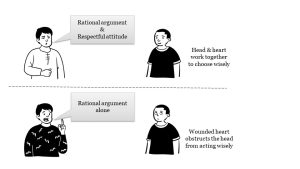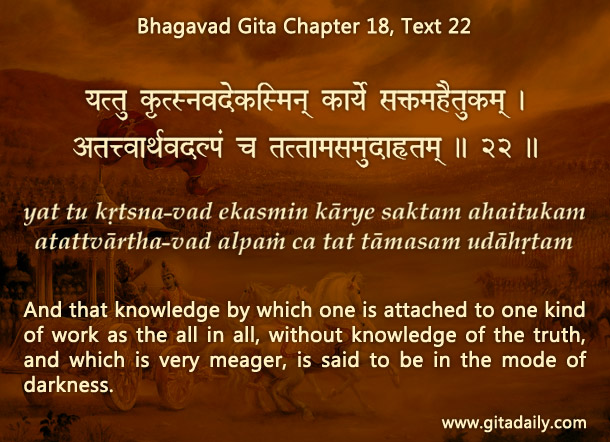 Suppose we come to know that an acquaintance has a harmful misconception. To protect them, we try to counter that misconception, and an argument ensues. Making our points logically and systematically, we win the argument, at least in the sense that they can’t intellectually counter us.
Suppose we come to know that an acquaintance has a harmful misconception. To protect them, we try to counter that misconception, and an argument ensues. Making our points logically and systematically, we win the argument, at least in the sense that they can’t intellectually counter us.
However, while arguing, suppose we come off as self-righteous or derisive of their viewpoint or even dismissive of them as a person. What if that wasn’t our intention? Doesn’t matter; they will still feel hurt. Even if their head is ready to accept our argument, their heart won’t be; it may obstruct them in acting on their understanding and choosing wisely. We may claim to have solved their problem — their head is no longer misdirected — but we may just have given them another, possibly bigger problem: a wounded heart. Operation successful, patient dead.
Does this mean we should never argue? No, it just means that arguing is not all that we need to do; we need to complement intellectual cogency with emotional sensitivity.
People aren’t unfeeling computers in which data can be nonchalantly deleted and replaced; they are conscious beings who may develop emotional bonds with everything, including their opinions — even those opinions that they haven’t subjected to rational scrutiny. When we expect to change their opinions by arguments alone, we are reducing them to just one aspect of their entire being: their head. By adopting such reductionism, even if unwittingly, we are exhibiting what the Bhagavad-gita calls knowledge in the mode of ignorance (18.22).
Countering such lop-sidedness, Gita wisdom can help us see people holistically, thereby learning to address both their head and their heart. When we strive consciously to be respectful and humble, we help them bond with us, thus making it less difficult for them to sever their bonds with their misconceived opinions.
One-sentence summary:
Winning an argument without winning people over often creates more problems than it solves.
Think it over:
- Operation successful, patient dead — how might this be the result of even a sound argument?
- What’s wrong if we argue cogently, but not sensitively?
- To help others, why do we need to first see them holistically?
***
18.22: And that knowledge by which one is attached to one kind of work as the all in all, without knowledge of the truth, and which is very meager, is said to be in the mode of darkness.
To know more about this verse, please click on the image


Leave A Comment